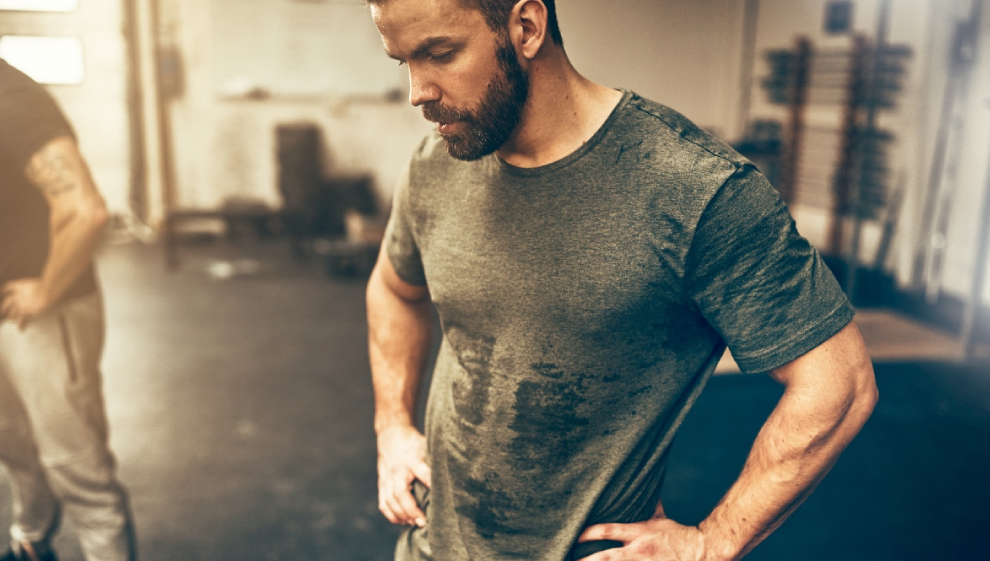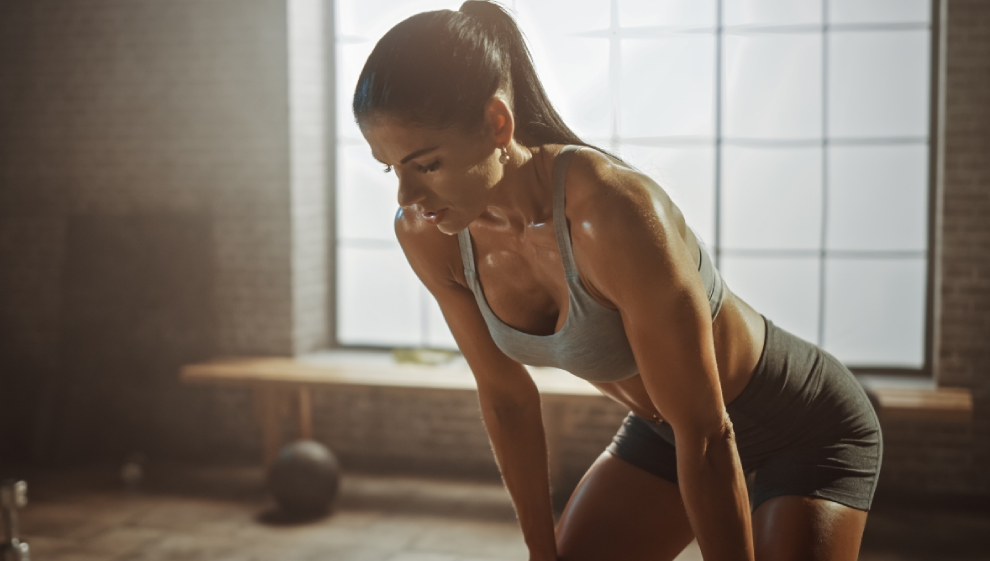Why you sweat so much when you exercise
- Overview
- What happens when we sweat?
- What's sweat made from?
- What is a normal amount to sweat?
- What do the professionals say?
- What can we do about it in the gym?
- Can sweating be a sign of something bigger?
- What factors affect how much we sweat?
- Do different exercises affect how much we sweat?
- Is sweat a good indicator of effort?
- Good sweating etiquette in the gym
- Does everyone sweat?
- Do treatments exist for excessive sweating?
- Related articles
We’re here to explore just what normal means and to dispel some common myths and misconceptions about the relationship between sweating and exercise.
What happens when we sweat?
Sweating is our body’s way of regulating temperature by releasing water through the sweat glands in our skin. When the sweat on our skin evaporates, the body is cooled.
When we exercise, our body temperature increases because our heart rate goes up. This results in more sweating because our body is fighting to keep our core temperature level.
What's sweat made from?
Sweat is mostly made up of water. It also contains some chloride, sodium, magnesium, potassium, and calcium.
Just like the amount, the contents of our sweat differs from person to person too. If you’re someone who regularly finds sweat crystalising on their forehead, you’re losing a lot of sodium as you perspire. Consider replenishing with a sports energy drink if this sounds familiar.
What is a normal amount to sweat?

We can get caught up in comparing ourselves to others in the gym. Sweating is no different.
If you’re self-conscious about your perspiration levels, you might be looking around the gym wondering if you’re on your own. The good news is, there is no “normal” amount to sweat.
Unfortunately, the biggest factor determining how much you sweat is genetics.
What do the professionals say?
Take a look at the video below to find out what our Nuffield Health personal trainers have to say about sweating in the gym.
What can we do about it in the gym?
- Carry a towel: carrying a towel allows you to wipe yourself down as you sweat. This prevents sweat from lingering and transferring onto the machines and equipment you are using
- Wear the right clothing: wearing gym clothes made with breathable, moisture-wicking fabric is a must. This fabric is lightweight and allows air to pass through the material, drying your skin out quicker and lowering the amount of sweat that lingers on the skin
- A good antiperspirant: most deodorants do a good job of reducing perspiration. If you sweat excessively, it’s worth shopping around for a strong antiperspirant that’s designed for people with hyperhidrosis
- Research your diet: consulting with a nutritionist or dietician can provide some insight into which foods have the potential to exacerbate sweating. For example, caffeine is known to stimulate the adrenal glands which can contribute to excessive sweating.
Can sweating be a sign of something bigger?
There are people with conditions like hyperhidrosis who sweat more than most people. Beyond the potential for self-consciousness and embarrassment, these conditions are not usually something to worry about.
If you have hyperhidrosis, you are not alone. This condition affects millions of people worldwide and can lead to the development of mental conditions like anxiety and depression if it goes unaddressed.
If you’re still concerned about how much you’re sweating or you’re looking for more information on the relationship between exercise and perspiration, consider contacting a GP or medical professional for advice.
Sound familiar? Click here to learn more about hyperhidrosis
What factors affect how much we sweat?
Absolutely. Our bodies are all different, with varying metabolic rates and fitness capabilities.
Factors like diet, lifestyle choices, fitness levels and our genetic makeup all contribute to the amount we sweat. It’s important to remember that sweating is a sign of working the body and shouldn’t be viewed as something negative.
Our mental health and whether we’re feeling run down with a cold or illness can also affect how much we sweat. Your environment also plays a role in determining how much you sweat. If you’re in an air-conditioned gym, you may find you sweat less than if you’re running outdoors in the midday heat.
Other factors may include:
- Hyperhidrosis diagnosis
- Hyperthyroidism
- Age
- Muscle mass
- Metabolic speed
- Gender
For more expert information on training and fitness, tune in to the Let's Talk Health podcast. Hear industry-leading experts and famous faces from the world of sport discuss what training looks like for them and how they navigate their own unique health and wellbeing challenges.
Do different exercises affect how much we sweat?
Cardiovascular exercise causes us to sweat the most because our body must fight to cool itself down due to increased movement levels and a higher heart rate. Running on the treadmill, climbing stairs, doing an indoor bike class and anything that gets your heart rate up will invariably make you sweat.
Activities like lifting weights, yoga and stretching can also cause you to sweat, however the exertion required to induce perspiration is a lot higher.
Is sweat a good indicator of effort?

Sweating is a very vague way of gauging whether you’ve had a good workout or not. It doesn’t utilise any data and can be easily influenced by your environment.
Your genetics are also largely responsible for how much you sweat, meaning effort and perspiration don’t necessarily correlate.
A better way to gauge the success of your workout is to use a heart rate monitor or similar device to gauge your peak threshold. This metric (and other data driven performance devices) can be logged and used to gauge progress over time instead of relying on sweating as a vague indicator of performance.
Good sweating etiquette in the gym
If you sweat heavily, using machines and equipment can make you self-conscious. It’s important to remember that you are in a gym where everyone is sweating and that most people are not overly concerned about using the machinery or equipment after others.
Carry a towel with you to wipe down the machinery or use the wipes that many gyms provide to keep the machinery sanitised. If you’re dripping wet after a heavy cardio session, it might be an idea to change into a second t-shirt if you’re moving onto the machines.
Does everyone sweat?
Ever wonder why you sweat buckets lifting weights but the lady on the treadmill in the corner isn’t breaking a sweat?
Lower levels of perspiration are usually nothing to worry about. As mentioned, perspiration levels vary greatly from person to person and are largely down to our genetics. The same factors that influence how much you sweat can also affect why you’re sweating less.
If you’re incredibly fit for example, your body will be more comfortable at a higher heart rate. This means you will sweat less during what would be perceived as intense exercise.
If you’re worried or overly concerned about a lack of perspiration, it’s always good to get yourself checked out by a medical professional.
Do treatments exist for excessive sweating?
If you’ve exhausted all avenues of investigation and are still feeling self-conscious, consulting a professional about the potential for treatment is the next step. We have listed some potential options to discuss with your GP below:
- Iontophoresis – this temporary procedure needs to be performed once a week ideally as it is not a permanent solution. It involves the use of a small electrical current that limits the functionality of your sweat glands
- Injections – certain injections can block the nerves that control your sweat glands. This procedure is more long term but still needs to be repeated around every 3 to 6 months
- Medication – oral medications can limit the stimulation your sweat glands perceive
- Thoracoscopic sympathectomy – this surgical procedure involves the cutting or clamping of the nerves involved with perspiration.
Last updated Thursday 24 October 2024
First published on Monday 21 August 2023
